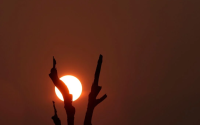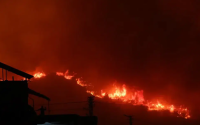In the two decades before she was gunned down along a particularly lawless stretch of the trans-Amazon highway, Sister Dorothy Stang fought for land rights for some of Brazil's poorest migrants.
The American nun preached that earning a livelihood and conserving the forest could be reconciled, and had convinced the federal land-reform agency, INCRA, to set up sustainable projects for over 400 families.
But in a world where there is huge international demand for cheap wood, she made enemies with the loggers and land grabbers who are assumed to be behind her murder last month.
Today, environment and development ministers from the world's richest countries were meeting for the first time, amid signs that politicians in powerful countries were preparing to move "from rhetoric to reality" in taking on the consumption patterns that fuelled Sister Dorothy's demise.
Illegal logging, climate change, energy consumption, and the environmental impacts of the rich world on poorer countries are all up for discussion in what is a precursor to a full-blown gathering of G8 leaders in Scotland in July.
Britain, which currently holds the presidency of G8 countries, has declared that sorting out the rich world's poor environmental record will be a priority. The prime minister, Tony Blair, and the chancellor, Gordon Brown, want Africa, the world's poorest continent, to be high on the agenda too.
"This G8 meeting, the first ever to bring together both environment and development ministers, focuses on the UK's presidency priorities of climate change and Africa," the environment minister, Margaret Beckett, said today.
Mrs Beckett, who is co-hosting the two-day event outside Derby, added: "The welfare of the planet and the wellbeing of its citizens are inextricably bound together. The problems that face us are by nature international and can only be addressed by the international community working together."
Environmentalists want Britain to help ensure timber comes from properly certified sources, such as the scheme run by the Forest Stewardship Council, by encouraging public authorities to use only legal timber for building works.
Mrs Beckett will later receive a document from representatives of local authorities all over Europe and every G8 member country - Britain, the US, France, Italy, Germany, Japan, Canada and Russia - who want politicians to give them the tools to change energy consumption patterns and promote awareness of how people can deal with global warming in their everyday lives.
The Local Government Association is urging the G8 to "move from rhetoric to reality" on these issues.
Earlier this week, Mr Brown acknowledged the crisis of climate change was one caused by the industrialised nations, but suffered by the developing world, and said it was "no longer tenable" to separate climate change from economic growth goals.
"Climate change is an issue of justice as much as of economic development. It is a problem caused by industrialised countries, whose effects will disproportionately fall on developing nations," he said on Tuesday.
Today, in a sign the timber trade could be listening, a joint letter to the Guardian from the bosses of eight timber firms logging in Africa promised to "do all we can to meet the demand for legal and sustainable timber and ensure Africa benefits fully from its resources".
However, it is likely that the success of the government's environmental record will be judged on whether it can persuade the US, the world's largest consumer and polluter, to come on board. That could help to bring about what Sister Dorothy died for.
http://www.guardian.co.uk/print/0,3858,5150625-111488,00.html






